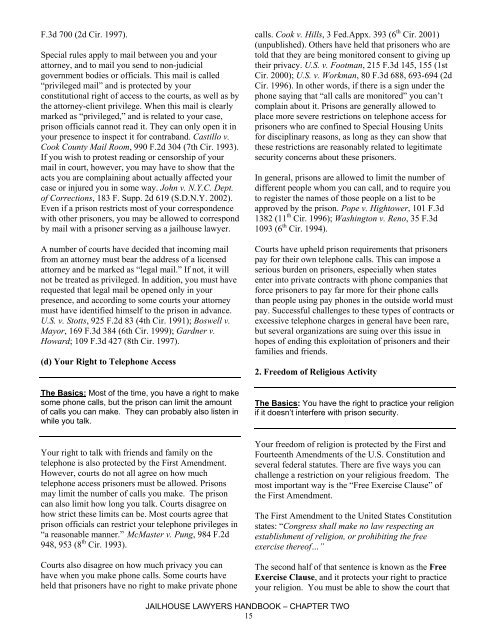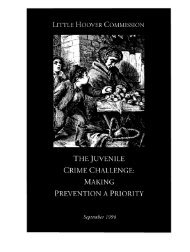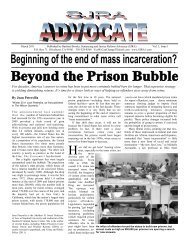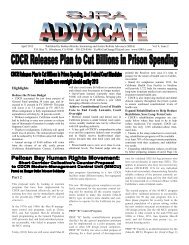Jailhouse Lawyer's Handbook - Sentencing and Justice Reform ...
Jailhouse Lawyer's Handbook - Sentencing and Justice Reform ...
Jailhouse Lawyer's Handbook - Sentencing and Justice Reform ...
Create successful ePaper yourself
Turn your PDF publications into a flip-book with our unique Google optimized e-Paper software.
F.3d 700 (2d Cir. 1997).<br />
Special rules apply to mail between you <strong>and</strong> your<br />
attorney, <strong>and</strong> to mail you send to non-judicial<br />
government bodies or officials. This mail is called<br />
“privileged mail” <strong>and</strong> is protected by your<br />
constitutional right of access to the courts, as well as by<br />
the attorney-client privilege. When this mail is clearly<br />
marked as “privileged,” <strong>and</strong> is related to your case,<br />
prison officials cannot read it. They can only open it in<br />
your presence to inspect it for contrab<strong>and</strong>. Castillo v.<br />
Cook County Mail Room, 990 F.2d 304 (7th Cir. 1993).<br />
If you wish to protest reading or censorship of your<br />
mail in court, however, you may have to show that the<br />
acts you are complaining about actually affected your<br />
case or injured you in some way. John v. N.Y.C. Dept.<br />
of Corrections, 183 F. Supp. 2d 619 (S.D.N.Y. 2002).<br />
Even if a prison restricts most of your correspondence<br />
with other prisoners, you may be allowed to correspond<br />
by mail with a prisoner serving as a jailhouse lawyer.<br />
A number of courts have decided that incoming mail<br />
from an attorney must bear the address of a licensed<br />
attorney <strong>and</strong> be marked as “legal mail.” If not, it will<br />
not be treated as privileged. In addition, you must have<br />
requested that legal mail be opened only in your<br />
presence, <strong>and</strong> according to some courts your attorney<br />
must have identified himself to the prison in advance.<br />
U.S. v. Stotts, 925 F.2d 83 (4th Cir. 1991); Boswell v.<br />
Mayor, 169 F.3d 384 (6th Cir. 1999); Gardner v.<br />
Howard; 109 F.3d 427 (8th Cir. 1997).<br />
(d) Your Right to Telephone Access<br />
The Basics: Most of the time, you have a right to make<br />
some phone calls, but the prison can limit the amount<br />
of calls you can make. They can probably also listen in<br />
while you talk.<br />
Your right to talk with friends <strong>and</strong> family on the<br />
telephone is also protected by the First Amendment.<br />
However, courts do not all agree on how much<br />
telephone access prisoners must be allowed. Prisons<br />
may limit the number of calls you make. The prison<br />
can also limit how long you talk. Courts disagree on<br />
how strict these limits can be. Most courts agree that<br />
prison officials can restrict your telephone privileges in<br />
“a reasonable manner.” McMaster v. Pung, 984 F.2d<br />
948, 953 (8 th Cir. 1993).<br />
Courts also disagree on how much privacy you can<br />
have when you make phone calls. Some courts have<br />
held that prisoners have no right to make private phone<br />
calls. Cook v. Hills, 3 Fed.Appx. 393 (6 th Cir. 2001)<br />
(unpublished). Others have held that prisoners who are<br />
told that they are being monitored consent to giving up<br />
their privacy. U.S. v. Footman, 215 F.3d 145, 155 (1st<br />
Cir. 2000); U.S. v. Workman, 80 F.3d 688, 693-694 (2d<br />
Cir. 1996). In other words, if there is a sign under the<br />
phone saying that “all calls are monitored” you can’t<br />
complain about it. Prisons are generally allowed to<br />
place more severe restrictions on telephone access for<br />
prisoners who are confined to Special Housing Units<br />
for disciplinary reasons, as long as they can show that<br />
these restrictions are reasonably related to legitimate<br />
security concerns about these prisoners.<br />
In general, prisons are allowed to limit the number of<br />
different people whom you can call, <strong>and</strong> to require you<br />
to register the names of those people on a list to be<br />
approved by the prison. Pope v. Hightower, 101 F.3d<br />
1382 (11 th Cir. 1996); Washington v. Reno, 35 F.3d<br />
1093 (6 th Cir. 1994).<br />
Courts have upheld prison requirements that prisoners<br />
pay for their own telephone calls. This can impose a<br />
serious burden on prisoners, especially when states<br />
enter into private contracts with phone companies that<br />
force prisoners to pay far more for their phone calls<br />
than people using pay phones in the outside world must<br />
pay. Successful challenges to these types of contracts or<br />
excessive telephone charges in general have been rare,<br />
but several organizations are suing over this issue in<br />
hopes of ending this exploitation of prisoners <strong>and</strong> their<br />
families <strong>and</strong> friends.<br />
2. Freedom of Religious Activity<br />
The Basics: You have the right to practice your religion<br />
if it doesn’t interfere with prison security.<br />
Your freedom of religion is protected by the First <strong>and</strong><br />
Fourteenth Amendments of the U.S. Constitution <strong>and</strong><br />
several federal statutes. There are five ways you can<br />
challenge a restriction on your religious freedom. The<br />
most important way is the “Free Exercise Clause” of<br />
the First Amendment.<br />
The First Amendment to the United States Constitution<br />
states: “Congress shall make no law respecting an<br />
establishment of religion, or prohibiting the free<br />
exercise thereof…”<br />
The second half of that sentence is known as the Free<br />
Exercise Clause, <strong>and</strong> it protects your right to practice<br />
your religion. You must be able to show the court that<br />
JAILHOUSE LAWYERS HANDBOOK – CHAPTER TWO<br />
15





